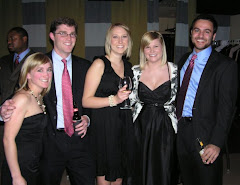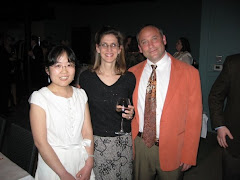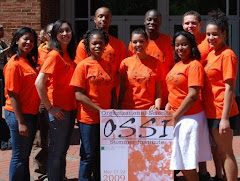Wednesday, December 29, 2010
Alumni Corner: Joseph Allen
by Logan Justice
 Name: Joseph A. Allen
Name: Joseph A. AllenWhen did you graduate?
December 2010
What is your current job role and where?
Assistant Professor, Industrial/Organizational Psychology
Assistant Editor, Journal of Business and Psychology
Department of Psychology
Creighton University
What are your greatest memories of OS?
Working with various faculty members and realizing how much they care about the success of the students. They don’t get enough credit for working with the students or for the amount of time and energy they put into the students. Because of their support, I could go to any of them with questions and they were all very helpful.
In reflecting back, what are the top three things you are taking away from the program?
1. Continued collaboration with OS faculty.
2. The teaching experience I was allowed to have while at UNCC and having a faculty mentor to guide me thru that process. Being exposed to that in a more supportive environment helped me be more prepared for my role at Creighton. It helped prepare me for dealing with students and teaching.
3. Making time to help others around you. If someone, at some point, hadn’t taken an interest in me, I would not be where I am today. The faculty and students in the OS program tend to keep an eye out for those who they can help and serve. I’m in essence trying to give back to the institution and process that helped me get here.
What advice do you have for new students on how to succeed in graduate school?
Work, work, work! There is no satisfactory substitute, especially as a grad-student. Thankfully, my wife and daughters were very supportive. I could work long hours and they were always there telling me to keep going and get it done. Also, “Celebrate the victories by climbing the next mountain.” Every time you achieve something don’t just sit there and think about how wonderful you are. Take a little time to enjoy the moment but keep on task. It is a marathon. If you don’t keep on task you will never get it done.
What job search tips do you have for current students?
First, please recognize I can only speak to the academic side of the job search. However, don’t be too picky at first in terms of the jobs you apply for. Although you should be selective to within a particular field (Management, I/O, Org. Comm., or Sociology), you also need to be open to opportunities you might not have considered before. Due to the publication lag, you MUST begin working with a professor during your first semester on publishable projects. It could take up to 3 or 4 years to be published and being published is very important. For example: I applied for 30+ jobs in the summer of 2009 with no publications and a lot of things under review. No one (absolutely, no one) wanted to talk to me at conferences or over the phone. However, in October 2009, I had 5 manuscripts go to “in press”. I then sent another 13 applications with this new information and received several interviews, invites, visits, etc. The only difference in my CV was the publications. Everything else, (e.g. teaching experience, dissertation progress, conference submissions, internships, consulting, etc.) was the same.
What about for preparation for going on the job market?
1. Publish or Perish
2. Gain teaching experience
3. Learn about the job search process in your first year
4. Keep track of everything you do
5. Get your vita started (look at examples of peers)
6. Be optimistic…OS students are seeing some real successes in a bad job market
Working with various faculty members and realizing how much they care about the success of the students. They don’t get enough credit for working with the students or for the amount of time and energy they put into the students. Because of their support, I could go to any of them with questions and they were all very helpful.
In reflecting back, what are the top three things you are taking away from the program?
1. Continued collaboration with OS faculty.
2. The teaching experience I was allowed to have while at UNCC and having a faculty mentor to guide me thru that process. Being exposed to that in a more supportive environment helped me be more prepared for my role at Creighton. It helped prepare me for dealing with students and teaching.
3. Making time to help others around you. If someone, at some point, hadn’t taken an interest in me, I would not be where I am today. The faculty and students in the OS program tend to keep an eye out for those who they can help and serve. I’m in essence trying to give back to the institution and process that helped me get here.
What advice do you have for new students on how to succeed in graduate school?
Work, work, work! There is no satisfactory substitute, especially as a grad-student. Thankfully, my wife and daughters were very supportive. I could work long hours and they were always there telling me to keep going and get it done. Also, “Celebrate the victories by climbing the next mountain.” Every time you achieve something don’t just sit there and think about how wonderful you are. Take a little time to enjoy the moment but keep on task. It is a marathon. If you don’t keep on task you will never get it done.
What job search tips do you have for current students?
First, please recognize I can only speak to the academic side of the job search. However, don’t be too picky at first in terms of the jobs you apply for. Although you should be selective to within a particular field (Management, I/O, Org. Comm., or Sociology), you also need to be open to opportunities you might not have considered before. Due to the publication lag, you MUST begin working with a professor during your first semester on publishable projects. It could take up to 3 or 4 years to be published and being published is very important. For example: I applied for 30+ jobs in the summer of 2009 with no publications and a lot of things under review. No one (absolutely, no one) wanted to talk to me at conferences or over the phone. However, in October 2009, I had 5 manuscripts go to “in press”. I then sent another 13 applications with this new information and received several interviews, invites, visits, etc. The only difference in my CV was the publications. Everything else, (e.g. teaching experience, dissertation progress, conference submissions, internships, consulting, etc.) was the same.
What about for preparation for going on the job market?
1. Publish or Perish
2. Gain teaching experience
3. Learn about the job search process in your first year
4. Keep track of everything you do
5. Get your vita started (look at examples of peers)
6. Be optimistic…OS students are seeing some real successes in a bad job market
Read more...
Topics:
Alumni Corner,
Spring 2011
Alumni Corner: Heather Gordon
by Logan Justice
 Name: Heather Gordon
Name: Heather GordonWhen did you graduate?
June 2010
What is your current job role and where?
Bank of America
Leadership Development Consultant
Leadership Assessment & Talent Analytics
Enterprise Leadership Development
Leadership Development Consultant
Leadership Assessment & Talent Analytics
Enterprise Leadership Development
What are your greatest memories of OS?
It would be the group sessions with all the students and faculty together where we would all share ideas regarding research topics. I heardsuch diverse perspectives on topics I wasn’t very familiar with and began thinking of things in different ways than what I was used to.
In reflecting back, what are the top three things you have taken away from the program?
1. The ability to do both qualitative and quantitative statistics analysis. It is something I do on a daily basis within my current role.
2. The ability to work with people with very different perspectives and learn to be open to very different ideas.
3. The ability to present and communicate both in writing and verbally.
What advice do you have for new students on how to succeed in graduate school?
Be open to new opportunities. Understand the way you think and feel today may not be the case later. Be open to change. Reach out if you are having any issues. There is always someone there to assist or offer you guidance.
What job search tips do you have for current students?
Network! Use your years in the program to attend conferences and network with individuals. Also find local events and chapters for networking. Make sure you get out there and tell people what you do within the program, what you are learning, whatyou can bring to an organization or school and why the OS program sets youapart from other candidates.
What about for preparation for going in the job market?
Do your research on the organizations or schools you are interested in, just like you would for a research paper. Use due diligence from the very beginning. Understand what issues the organization is facing or what sets it apart from others so that you are fully prepared as you go into the interview.
Read more...
Topics:
Alumni Corner,
Spring 2011
Faculty Spotlight: Dr. Eric Heggestad
by Logan Justice
What is your current job role at UNC Charlotte?
Director, I/O Psychology Masters Program Associate Professor of Psychology Associate Professor of Organizational Science.
Tell me a bit about yourself before you became a professor.
In graduate school I received a fellowship from the Air Force to finish my degree. Upon completion of my degree I went to work at the Air Force Research Laboratory in San Antonio, TX. The funding for the lab was cut 7 months after I began, and I was out of a job. Luckily, I found a job at a consulting firm in Washington, DC. I really enjoyed that work and stayed there for two years. But, eventually I wanted to get back into research and I was lucky enough to be offered a position at Colorado State University. I stayed there for 5 years. Then came the opportunity to come to UNCC and be part of a new PhD program. What a cool opportunity – who could have passed that up? This is my 6th academic year here.
Why did you decide to become a professor?
It was something that knew I wanted to do since grad school. I looked at the opportunity to work for the Air Force Research Lab as a kind of post-doctoral position. It was a place I could go and do a lot of research and write lots of papers. I really thought that this would help me get a great academic position. I have always enjoyed the research aspect of my job.
What advice do you have for graduate students on how to get the most out of graduate school (to succeed in graduate school)?
Maintain a good balance between student life and personal life. I remember while in Grad School it was easy to become immersed in student life with all of the reading, paper writing, and research expectations and to forget that a personal life existed as well. Remember to exercise and take time for fun and build relationships.
What do you most like about being part of the OS program?
What do you most like about being part of the OS program?
The students are fantastic! I am impressed every day by the quality of students we have in the program. It was my expectation starting a new PhD program that we might have to build a reputation and that it might take a while to attract quality students. However, we have had fantastic students from the day one. They provide energy and are so inspiring. They keep me on my toes. I love the interdisciplinary aspects of the program. As I have become familiar with the other disciplines in the program, talked with others and begin to connect, I feel like I’m learning so much which is really cool. I love the fact we can approach problems from so many different angles and different ways. When we bring all of the disciplines together it becomes really powerful.
What is the coolest project that you are currently working on?
What is the coolest project that you are currently working on?
I’m beginning some analysis for research I’m working on with Dr. Rogelberg. We are looking at how relationships between the variables being studied can be influenced by who does and who doesn’t participate in a survey. We know what non-response does to the mean level of the variables but so much about what it does to the relationship between them. I’m working on a project with a faculty member from Ohio State University. We are looking at how to reduce self presentation bias or faking on a personality test. We are looking at a strategy asking people to re-take the test if we believed they faked or cheated the first time. Adrian, one of my graduate students, and I are thinking about some changes to how assessments centers are implemented and scored. I am excited about this idea. Dr. Shanock and I have applied for a grant with the Army. The proposal examines issues of leadership; specifically how the degree of similarity in a leaders’ self perceptions and the perceptions of his or her followers impacts leadership outcomes.
Read more...
Topics:
Faculty Spotlight,
Spring 2011
Monday, December 13, 2010
Faculty Spotlight: Dr. Shawn Long
by Logan Justice and Daniel Bonilla
In this issue Dr. Shawn Long, Chair for the Department of Communication Studies, is in the faculty spotlight.
What is your current job role at UNC Charlotte?
I am the Chair for the Department of Communication Studies and I am an Associate Professor in Organizational Communication.
Tell me a bit about yourself before you became a professor.
I grew up in Harlan KY, a small rural community in Southeastern Kentucky, TN State - UG & Master in Public Administration.
Why did you decide to become a professor?
While attending TN State as a grad assistant in the Honors Program, I was asked to substitute for a professor who was traveling to a conference. I was charged with creating an entire session for that particular course, Intercultural Communication. It was this experience where I “caught the teaching bug” and decided that I enjoyed the art and practice of teaching.
What advice do you have for graduate students on how to get the most out of graduate school (to succeed in graduate school)?
1. Take advantage of courses that centrally interests them as well as courses that will provide them with skills that are transferrable beyond their matriculation.
2. Be a part of any grant projects, if possible, to understand the nuances of grant work. This is quite valuable in that you may be expected to fund your research.
3. Continue or start reading trade publications and newspapers about issues organizations are currently struggling with. Avoid the ivory tower mind set by engaging in problems and circumstances facing organizations on a daily basis.
4. Be nimble and open in understanding organizational issues. This is where the interdisciplinary training will really come in hand.
What do you most like about being part of the OS program?
Exciting Leadership – Steven Rogelberg has done a phenomenal job at molding the program into what is becoming not just a local but, a national player in many regards. His excitement is contagious.
The outstanding and authentically dedicated faculty working in OS. I really enjoy hanging out with them interpersonally and we get to discuss neat and interesting projects as a by-product of our continuous engagement.
The students- We have some of the best graduate students around. I have found “their level of maturity extraordinary and they care deeply about this program.” Although the program is extremely competitive to get into and requires an extreme amount of focus and dedication, OS is such a highly humane graduate program for students and faculty.
The concern faculty have in student success makes the program such a benchmark. OS is a good academic neighbor and academic citizen. Additionally, the research OS Faculty are fascinating, contemporary and just cool.
What is the coolest project that you are currently working on?
I am very excited about my scholarship on virtual work. I just published a book on communication, relationships and practices in virtual work and recently received a contract for my next book on virtual work research methodologies. Finally, I am super excited about my continuous work with OS students, particularly with Sharon Doerer on examining diversity communication on corporate websites.
Read more...
Topics:
Faculty Spotlight,
Spring 2011
Subscribe to:
Comments (Atom)










